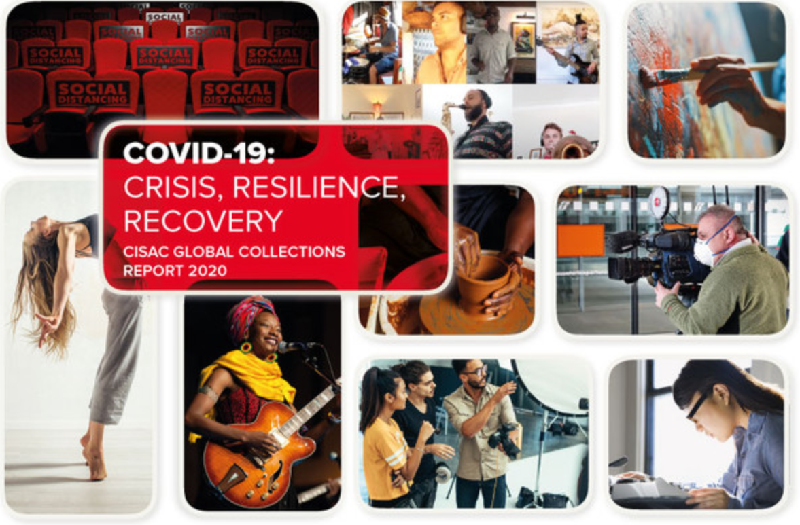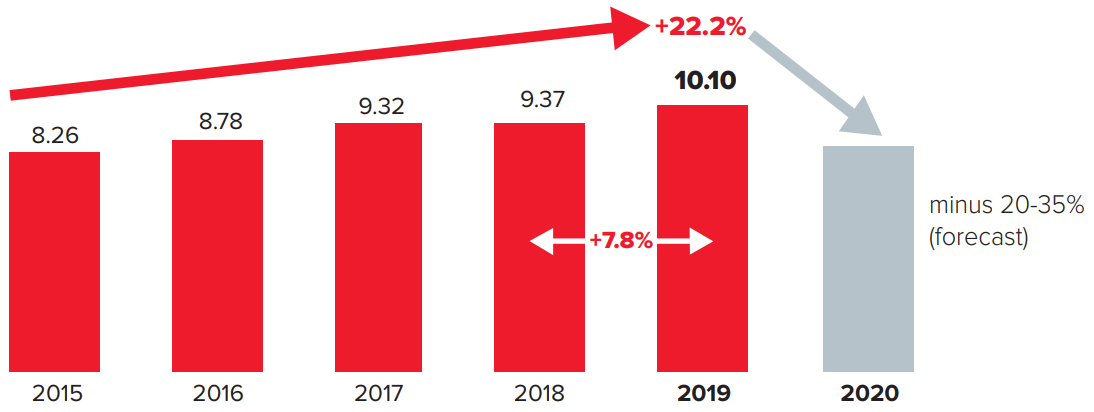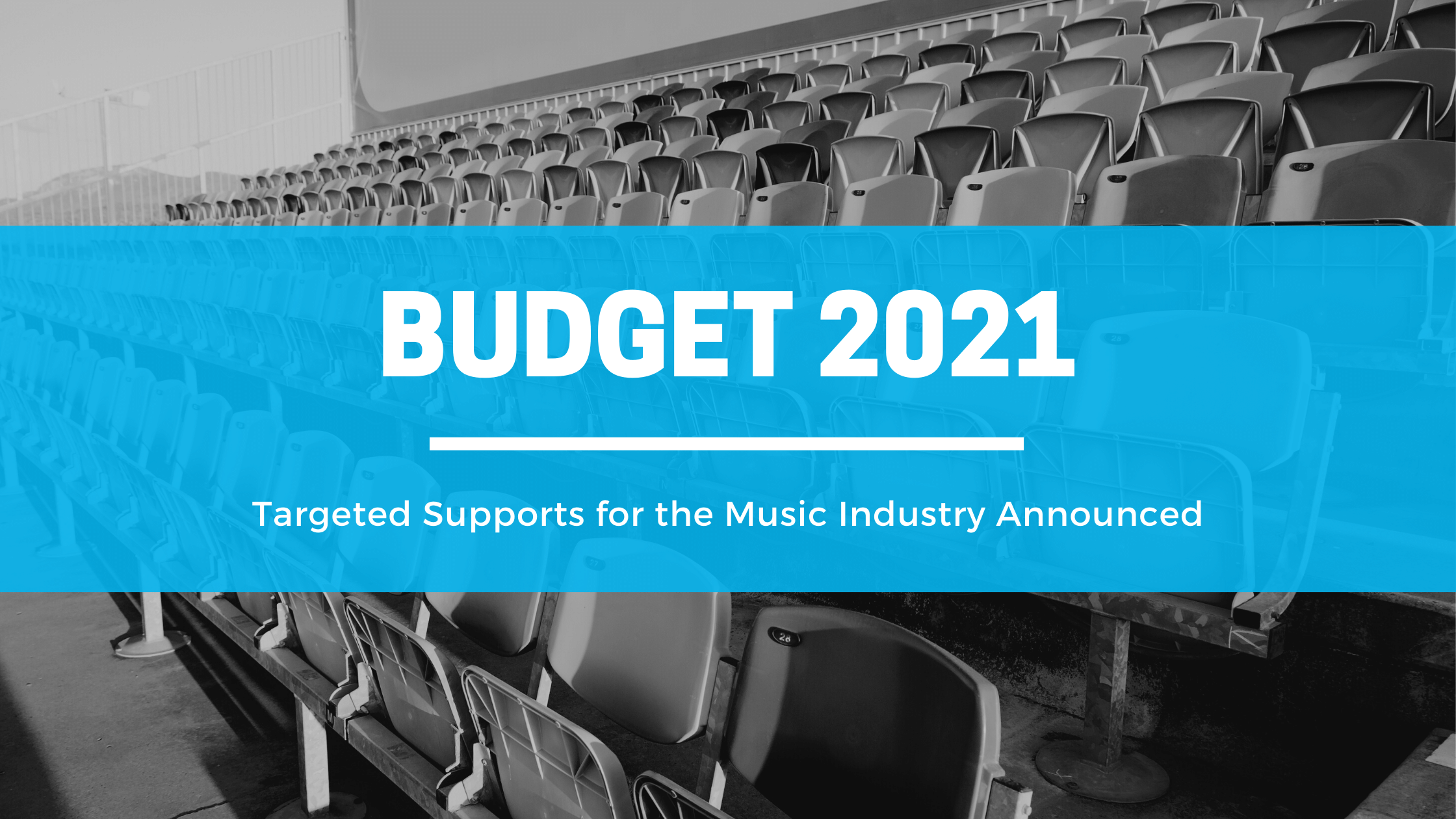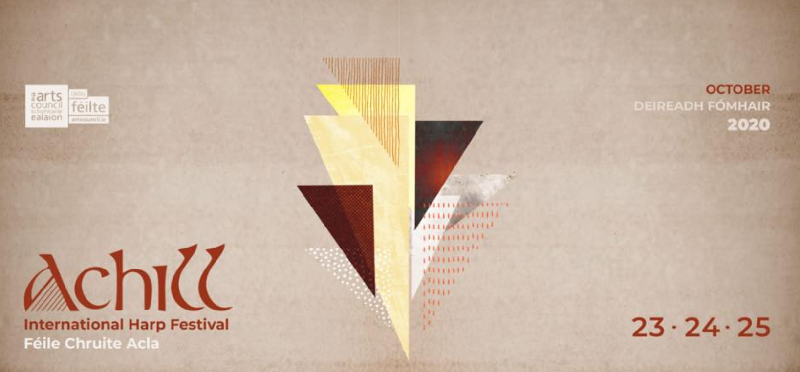A range of music industry supports was announced by the Government today as part of Budget 2021. “IMRO welcome the significant extra funding available to the Arts Council bringing its total budget to €130m. A €50m fund for the commercial live entertainment sector is also very welcome – these supports will go some way to ensuring we have a live industry to return to post COVID. The wider music and entertainment industry have worked tirelessly and in unison to achieve these lifelines. Departments right across government have recognised the great threat to our creative industries. Budget announcements today mean we can look forward with some degree of confidence to the future.” – Eleanor McEvoy, IMRO Chairperson.
Total funding for the culture sector will increase in 2021 by 70% compared with the initial 2020 allocation in Budget 2020. The funding will comprise €270m in current expenditure and €60.7m in capital investment, and reflects an acknowledgement by Government of the devastating impact that COVID-19 restrictions have had on the sector.
For the first time, the Government provides support for live entertainment in the amount of €50m. This will include measures for the commercial entertainment sector for the first time, and will support live entertainment in venues across the country, building on the Stimulus scheme announced in July. It will also see support for activities at community level leading to greater work opportunities for crew and venue workers nationwide. There will be further supports for music, building on the phenomenal demand for support under the July stimulus Music Scheme operated by First Music Contact. A scheme of capital grants for equipment will also operate in 2021. Combined with measures announced by the Minister for Finance, this will provide additional supports to a sector severely impacted by COVID-19.
Arts Council funding is up €50m from its initial 2020 allocation to €130m. This additional investment empowers the Arts Council to help artists, arts workers and arts organisations come through this crisis and play their part in the national recovery. It will ensure that events of the highest quality across all art forms can still reach the public in new and blended ways. This support will protect jobs and it will see thousands of artists enabled to create new work. This year, the Arts Council is providing support to a wider range of stakeholders impacted by the Pandemic. This increase in funding will allow the Arts Council to broaden its reach further and in particular to reach out to workers in the sector, especially those who would not previously have been beneficiaries of support from the Arts Council.
Other measures announced today include:
- Self-Employed workers receiving the Covid-19 Pandemic Unemployment Payment will be able to earn €480 per month and retain their PUP. Those who have been on these payments for four months or more, will also receive a Christmas bonus.
- Music industry stimulus programme for songwriting and recording projects announced by the Department of Culture, Heritage and the Gaeltacht in September will be extended into 2021.
- A €9m increase in funding for Screen Ireland from its initial 2020 allocation to over €30m. This record allocation will further support Screen Ireland at this critical time. In addition, the extension of the Section 481 regional uplift for an additional year is an important support and will further assist growth in the industry.
- An allocation of €8m is made to the National Concert Hall to allow for the transfer of the National Symphony Orchestra from RTÉ. This will be a significant step towards the objective of enabling the orchestra to be established as a world class orchestra which will, with the NCH, provide a creative and imaginative programme strategy that will greatly enhance the offering of the combined organisation to the public.
- The establishment of a new scheme, the COVID Restrictions Support Scheme (CRSS), to provide targeted support for businesses including those operating in the arts, culture and entertainment sectors. Businesses impacted by pandemic can get rebates of up to €5,000 a week under this scheme.
- New €55m support fund for strategic tourism businesses – VAT on the sector reduced to 9%, will improve competitiveness and viability of businesses.
- Additional capital funding will see progress in the ongoing programme of investment in our capital institutions including at the National Library of Ireland, the National Archives of Ireland and the Crawford Art Gallery.
- Decade of Centenaries increased funding to €5m to allow for the appropriate commemoration of the centenary of events leading to the foundation of the State.
- Funding for TG4 up €3.5m to €40.7m.
Minister Catherine Martin said: “The diverse range of sectors served by this Department have been amongst those most severely impacted by the COVID-19 pandemic. Employing many hundreds of thousands of our fellow-citizens, right across the country, these are the sectors that thrive when people congregate to enjoy their leisure time together. They were the first to close as a result of the pandemic, and they are likely to be amongst the last to return to full operations in the future. Our Cultural Institutions and theatres, our tourism destinations, pubs and restaurants, our sporting occasions and our Gaeltacht communities have all been severely hit since March. Many are shut, or are hugely curtailed, yet these activities are the very ones which bring us all joy, and which are crucial for all our physical and mental health.
“This Budget has now put in place a number of substantial measures to support and strengthen these sectors through 2021.
“Of course, we have been in constant dialogue with stakeholders and sectoral representatives throughout the crisis. Together with my officials, I have set up a number of different engagement channels, to ensure that we, as policy-makers, are listening closely to the voice of the cultural practitioner, the hospitality business-owner, the sporting bodies and our Gaeltacht communities. A wide range of targeted and imaginative government supports put in place since March have drawn on this interaction, and have helped sustain activity and employment in these sectors.
“Budget 2021 has been informed by this ongoing strong engagement between my Department and the sectoral representatives. The strong suite of significant measures detailed below is a robust and targeted response to this crisis; it will support resilience and recovery, and will ensure that Ireland will thrive once more on the global stage in the fields of tourism, culture, sport and linguistic heritage, of which we are so proud.
“These are sector-specific measures, and are of course augmented and supplemented by the economy-wide business support and social welfare measures which were announced in the budget, and which my Cabinet colleagues, including Finance Minister Paschal Donohoe, have already gone into further detail.”












